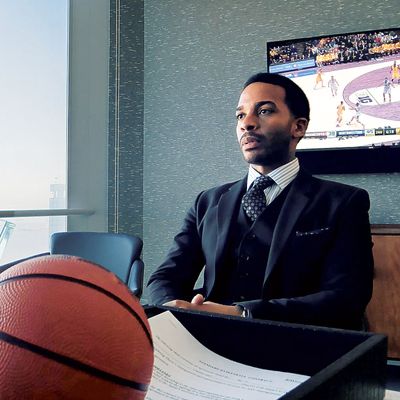
Steven Soderbergh’s made-for-Netflix movie High Flying Bird (from a script by the playwright Tarell Alvin McCraney) takes place in Manhattan during a months-long NBA lockout with no agreement in sight between owners and players. It sounds like the premise for a rowdy big-business melodrama with fast talk and hoops, but the tone from the start is chill, bordering on mournful, and it’s marinated in righteous resentment.
The story opens in a fancy restaurant high above the city, where a seasoned agent, Ray (André Holland), lambastes his young client, the No. 1 draft pick Erick Scott (Melvin Gregg), for taking out a high-interest loan that — with no checks coming in — Erick can’t pay back. Erick’s precarious finances, says Ray, are no fluke: This kid is one more in a line of black NBA players lured with crazy-big money by white club owners and then left high and dry. Ray, we see, has one foot in gung ho capitalism and one in raising his players’ historical consciousness, and the stances aren’t easy to reconcile. His harangue is capped by news that his corporate credit card has been canceled, and he has to walk to work, where his smug white superior (Zachary Quinto) in a faceless corner office seems ready to dump him.
High Flying Bird is an unshapely piece of storytelling — there are gaps in the plot, and it never locks into a rhythm — but that mournfulness and resentment seep into you. The title suggests a basketball player at the peak of his or her power, but it’s actually based on a song (by Billy Edd Wheeler) sung by someone looking up at a bird flying free, someone “rooted like a tree” who’s “got the sit down, can’t cry / Oh lord, I’m gonna die blues.” The tragedy, says Ray’s bitter but still avid former coach, Spence (Bill Duke), as he gazes at young players at a Bronx community center, is that the game has been superseded by the game on top of the game. You want to see Ray pull off the impossible, not just save himself but rekindle the love for the game under the game — the real game.
I confess I still haven’t made sense of Ray’s scheme (I had the same trouble with parts of Soderbergh’s Logan Lucky), but I know it involves getting players back on the court by encouraging trash tweets between Erick and a future teammate, Jamero (Justin Hurtt-Dunkley, an excellent name for an actor playing a basketball star), and then approaching — wait for it — Netflix to document the unofficial goings-on. Soderbergh’s tricky syntax in the last 15 minutes recalls his heist movies, but McCraney hasn’t written a heist-movie script. The 38-year-old playwright (his In Moonlight Black Boys Look Blue was turned by Barry Jenkins into Moonlight, and he’s currently represented on Broadway by Choir Boy) likes to linger. He revels in two-person scenes that start tart and grow more intimate, sometimes discomfitingly so. His characters want to drop their defenses even when their interests are opposed. He has written a juicy part for Holland, who wears sleekly tailored suits that suggest a man who has styled himself in ways that don’t jibe with the person he really is. Kyle MacLachlan finds layer upon layer of unctuousness as an obscenely wealthy team owner, and Bill Duke — that magnificent rumbling iceberg — has a role that’s worthy of him: Watch his features congeal when someone attempts to draw a line from slavery to basketball.
I wonder if McCraney was tempted to ditch the lockout plot and concentrate on three marvelous female characters. Sam (Zazie Beetz), with her wonderful lopsided frizz, is Ray’s hard-charging ex-assistant who’s always turning up on his stoop to get advice but who ends up end-running him, first with the players’ rep, Myra, then with Ray’s (randy) star client. The amazing Sonja Sohn is Myra, who’s b.s.-averse until she has a few drinks and her terror of losing her partner surges to the surface. And oh, Jeryl Prescott, who plays the rival Jamero’s mom-manager-agent, is a flamboyant spokesperson for the union of Jesus and Mammon. She’s so powerful that when she leans into the frame, the lens seems to bend to her.
You should know two things in advance about High Flying Bird. The first is there’s too little basketball. (Why does Soderbergh cut away from Erick and Jamero’s grudge match?) The second is there’s a reading list. The movie leaves you with a passionate plug for Harry Edwards’s 1968 manifesto The Revolt of the Black Athlete, which charts the history of white exploitation of black men in sports and is poised to attract a new generation of activists. Dr. Edwards even gets a victory-lap cameo. His 50th-anniversary edition renews the call for a “vigorous” and “vociferous” struggle against white supremacy “in every realm and within every context of American life.” High Flying Bird could have been made by Edwards himself: great message, great branding.
*This article appears in the February 4, 2019, issue of New York Magazine. Subscribe Now!


